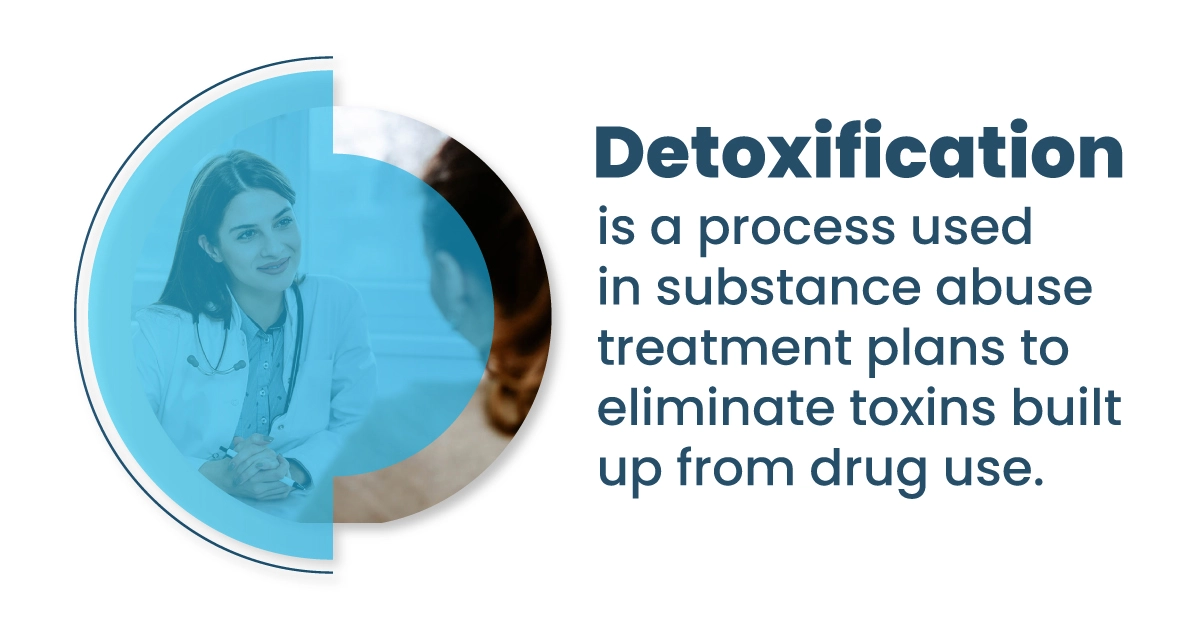A detox is a medical procedure in which your body gets rid of toxins accumulated while using drugs. There are many suggestions people may have for ways you can quit using drugs quickly and successfully.
But not everyone can benefit from a single solution. You must determine which therapy or treatment plan suits you the most.
It is important to understand that drug detox is not as simple as just stopping taking the drugs. The detoxification process is a necessary first step in many substance abuse treatment programs for various reasons and with varying intensity levels.
The drug detoxification process involves taking an individual through various phases of medications and care over time to get them clean from their addiction or dependency on drugs.
Key Takeaways
Drug detox can be challenging, especially for those dependent on illegal drugs or excessive alcohol drinking. However, to make the process smooth medical supervision is the primary need.
This article will help guide you through the drug detoxification process.
- Detoxification is a process used in substance abuse treatment plans to eliminate toxins built up from drug use.
- Once a doctor has assessed an individual, they assign them to the best drug addiction or dependency treatment plan for them.
- After and during detoxification, medical care such as medical checkups, medication, counseling, or therapy support is required to manage the withdrawal symptoms.
- The final step in the drug detoxification process involves monitoring the patient’s progress so that they can continue to receive treatment if needed.
Before starting any treatment program, It is important to assess the patient’s physical and mental health, as well as their environment and relationship with family and friends.
Click here to learn more about The Haven Detox-New England, or call us at (844)933-4145.

What Happens During Detox
The drug detoxification process begins with an assessment by your doctor. Then, your doctor will either recommend a taper or complete withdrawal from the substance. Medical detox involves removing toxins from the body.
Next, individuals are provided medical assistance to help manage their withdrawal symptoms and cravings. Finally, your doctor may recommend you enter a rehab facility for continuing care.
Detox programs typically last from a few days to a few weeks depending on the person’s medical background and substance use.
For some individuals, medical detox should take place in an inpatient setting, so medical supervision is available 24 hours a day to address medical threats or emergencies.
After medical detox is finished, individuals are usually referred to longer-term treatments such as intensive outpatient or residential programs that can provide more comprehensive support for lasting abstinence from drug use.
Who Needs Detox
Patients struggling with addictions have difficulty fighting against substance abuse without assistance. Detoxification is a key step in getting clean, so medical professionals must help those in need.
A drug detox program can be the best chance for patients to rid their bodies of drugs, restoring balance and health.
Patients addicted to substances may require more significant help than self-directed therapies, including medication and counseling, which medical professionals can recommend throughout the detox process.
For those battling addiction, a professional detox program can be indispensable.
How Long Does Detox Last
Detox is a crucial step in the recovery from addiction to drugs or alcohol. Detox is defined as the body’s physical process of eliminating toxins that can build up from using drugs or alcohol over an extended period of time.
Detox times can vary greatly depending on the person and the drug they are detoxing. Some people complete their detox in weeks, while it could take months for others.
It is important to note that some withdrawal symptoms may last much longer than the detox itself, so individuals should continue to care for their health and seek help if necessary.
Detox helps bring people back into balance and provides a starting point for striving toward achieving true freedom from addiction.
Drug detox duration depends on the type of drug taken, how much was ingested, and how long ago the person’s last dose was. The body’s natural detox process begins in the liver, where toxic substances stored in fatty tissues slowly break down.
To accelerate recovery, doctors may recommend medications and counseling as part of the treatment plan. Understanding how long drug detox may last will be beneficial in ensuring that individuals dealing with addiction receive the support they need toward recovery.
Detox as the First Step in Addiction Treatment
Detox is a process many people go through when struggling with addiction to drugs or alcohol. Detox can be uncomfortable due to the withdrawal symptoms that come with purging the substance from the body.
Multiple treatment options are available to assist those going through detox. Detox centers specialize in helping people successfully manage their withdrawal symptoms, allowing them to comfortably work through the process and make changes necessary for long-term sobriety.
Detox should not be approached alone. Along with various treatment options, treatment centers provide supportive outlets and specialized tools that help individuals achieve lasting abstinence.
At The Haven Detox-New England, alcohol, benzodiazepine, cocaine, heroin, methadone, methamphetamine, opioid, and suboxone detoxes are available.
Withdrawal Symptoms During Detox
Withdrawal from drugs or alcohol can be very uncomfortable and, in some cases, even dangerous. Many inpatient detox centers provide 24-hour support to help people who are going through this difficult time.
During detoxification, individuals in recovery may experience a wide variety of symptoms, including:
- Sweating
- Nausea
- Cramping
- Shakiness
- Headaches
- Restlessness
- Fever
- Chills
- Sweating
- Depression
- Anxiety
- Agitation or irritability
- Mood swings
Severe withdrawal symptoms include:
- High blood pressure
- Heart palpitations
- Seizures
Depending on the situation and the substance, these symptoms can take days or even weeks to subside.
Medications and support groups in the form of group sessions can also help during this time by providing individuals with much-needed emotional and physical support.
With patience, dedication, and proper care and attention, you can safely recover from drug or alcohol withdrawal.
Frequently Asked Questions (FAQ)
What happens when you detox?
Detoxing from addictive substances is a complicated process. While it is known that stopping addictive substances can help in the long run, there are serious physical and psychological consequences from attempting to detox alone. During the process, patients are at high risk for complications depending on their age, medical conditions, and use of addictive substances. It is highly recommended that users seek advice from a doctor specializing in addiction treatment before attempting to detox themselves.
A professional medical team can provide more insight into how best to manage withdrawal symptoms and treat any additional medical issues that may arise during the process.
How long does it take to detox the whole body?
Detoxing the whole body is a process that can take weeks or even months, depending on the prescription medication or program utilized. It is important to be in a safe environment for this process, and many find treatment centers ideal for achieving long-term detoxification results. They provide resources such as medical professionals, nutritionists, and other therapeutic services to ensure that the body can accomplish its goal of complete detoxification.
Different programs may vary in the timeline, so it’s important to find what works best for you and your body. Ultimately, when done correctly, entire-body detoxification can provide positive health benefits that will last far longer than the initial time spent working toward it.
How do you know if detox is working?
Knowing if detox works can be difficult for many people, especially teens. Often addictive substances can have lasting effects on the body and mind, making it harder to recognize signs of progress. Besides tracking the intake of addictive substances, pay attention to the number and variety of questions asked by doctors during the process.
Are you becoming more and more aware of your addictive behavior? Are you consuming fewer addictive drinks? Do you feel better and have a healthier body? Ask yourself these types of questions when evaluating if detox is working successfully.
How do you detox fast?
Drug detox programs provide individuals with a safe environment to actively begin their journey of long-term recovery from addiction. Programs may vary in length and intensity depending on the individual’s level of use and dependence.Every program should emphasize creating an effective treatment plan that meets the individual’s long-term needs for sustained sobriety.
In such programs, support staff will help the individual engage in activities that allow for a faster and more successful detox, such as medically supervised programs, therapy sessions, lifestyle changes, or even holistic approaches like yoga and nutrition education.
How do detox drinks work?
Detox drinks are becoming increasingly popular as many people strive for optimal health and wellness. These beverages, usually made of natural folk remedies or sold in ready-made mixes, help to cleanse the body, flushing out toxins with powerful antioxidant ingredients like green tea and various herbal extracts.
Not only do they purify and oxygenate the blood, but they also work by helping to support the body’s natural detox processes such as skin sweating and urine output, as well as optimizing gut microbiome health.
The Haven Detox-New England for Personalized Detox
At The Haven Detox-New England, we offer clients a peaceful location to begin their detox. The experienced, highly qualified medical staff is exceedingly knowledgeable and provides expert care and support every step of the way.
Each patient’s experience is tailored to meet their needs and begins with an initial assessment and evaluation.
As part of our treatment plan, clients receive lifestyle counseling and therapeutic techniques designed to nurture their bodies and mind while easing withdrawal symptoms.
With its high-quality clinical expertise, The Haven Detox-New England provides a comprehensive approach that addresses aspects of addiction recovery to initiate lasting change. Our treatment programs include detoxification, residential treatment programs, and more.
Get more information about our detox programs by calling us at (844)933-4145.
